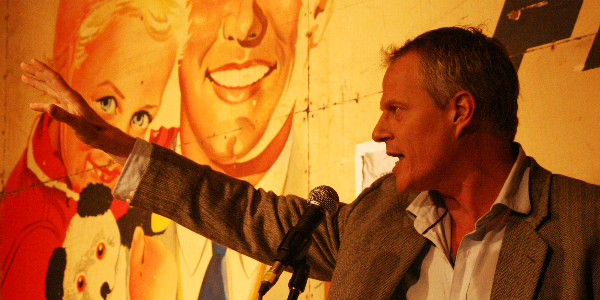Interested in watching poets do battle, or reading the words of our nation and others alike?
When you think cool, accessible and multi-media you probably don’t think poetry. You also probably don’t think a bunch of stuffy guys from the 18 th Century sitting around in drawing rooms and writing by hand is your cup of tea. Well it’s not Luis Gonzalez Serrano’s, director of the Overload Poetry Festival in Melbourne, either.
The Festival is running now until Sunday September 19; holding slams, using Skype and our national buildings, and celebrating those who died before they really had the chance to give the world the beauty of words that poetry so often does, despite its dirty reputation in our collective memories as a despised topic in literature classes. Find yourself interested in watching poets do battle, or reading the words of our nation and others alike? According to Luis, it’s best if you’re "not even [an] English student." Beat spoke with festival director Luis Gonzalez Serrano.
What was your vision for this year’s festival?
Screening The Word. Basically how people are using technology to assist their writing of poetry. We’re seeing a different way poetry is presented to the public – not so much about books but more podcasts, video poems and all sorts of developments. Technological elements are being incorporated into the craft and that sort of happened organically. People started to send us proposals for things that involved some sort of really intriguing take on technology in poetry so it was easy to arrive at the vision.
Do you think that using these new mediums has helped to change the general public’s ideas about poetry as it’s often conceived?
Yes. We want to reach a lot more people and change their perspective and preconception about what poetry is. Perhaps [it’s] a problem that might be happening at a school level where things aren’t changing – people are being taught the old way, to read old poems and people think that poetry was something that was written in the 18th century. That is the misconception that we want to change, and for that reason we want to be experimental, to be pushing the boundaries, to show people – especially young people – that it’s a different thing now, that it can be accessible and relevant to our modern day life.
I notice that the electronic poetry is still open for people if they want to send some in, could you explain a little about it?
Someone had given me the idea before of trying to scroll text on one of the Melbourne landmarks, and that would have been really difficult to do without the technology to put it in place. Then one day I looked up at Fed Square and there’s all these scrolling electronic text and it was so easy. People are open to it. We thought, let’s put something in there that’s interesting and gets people’s attention about poetry.
The best way of doing that is to go with short form: one line, haiku, 50 words, mini prose poems or short stories that can be read within a short time frame, that can just be continuously scrolling and fortunately it was really well received. Poets loved the idea and so we had many submissions last year… it’s a beautiful thing that surprises you. You’re walking down Fed Square and all of a sudden you look up and there’s a poem.
Another interesting event is the Slam. For those that have never been, what can they expect?
Some people would describe it as the last way for the poets to be fully accountable for their work to the public. When you publish a book you don’t have instant feedback from anyone, you have no idea whether people like it or hate it. On the slam, because the notion of it is to be judged, you have a round of ten to 20 poets. Each one has to get on stage and give their best poem, their best performance, in under three minutes. It could be funny, philosophical, a play on words; people take on the idea in many different ways. It’s about getting the interest of the audience and getting them to like it, because you’re being judged by three people completely at random who are in the audience. They preferably have nothing to do with poetry and sometimes they’re not even English students – they could be a complete outsider to the world of poetry.
What are the highlights of this year’s festival?
We’re going to have a cook up with an international slam that we’re going to hold against Singapore and then we’re holding another one against Scotland… that’s going to be via Skype. The other one is the bilingual event called Azahares, which is a tribute to Miguel Hernandez. He was a freedom fighter who died at a very young age in jail. Despite the fact that he died so young and didn’t have much work, it resounded so much in the Spanish-speaking world that he is one of their best-known poets. This year is the 100th anniversary of his birth.
Finally, what’s your favourite poem?
Cesar Vallejo’s The Black Heralds. It’s a poem about hitting rock bottom and at the same time coming out of that and coming out stronger.
The Overload Poetry Festival is running now until Sunday September 19 at Federation Square and various other venus. Tickets and more information about events and tickets are available through overloadpoetry.org.







